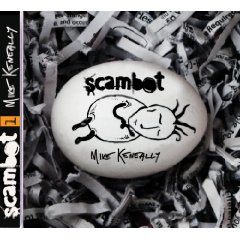
Exowax
Add Mike Keneally to the list of musicians who won’t let the CD go without a fight. Scambot comes with a dedication to “anyone who still listens to entire albums with their headphones on,” and he’s labored mightily to gain that level of attention. This disc offers not only 66 minutes of music (with 18 tracks ranging from 0:51 to 12:10), but one of those booklets so thick with lyrics, credits and narrative that you can’t get it back into the jewel box once you’ve taken it out.
The plot of this disc, the first part of a trilogy, concerns an unsuccessful composer named Scambot and the attempted theft of his identity by a nefarious businessman named Ophunji. Keneally deploys each of the styles those familiar with his past opuses might expect – XTC/Rundgren-style pop, fusion, metal – with twisted instrumentals (avant-classical filtered through rock instrumentation) dominating the program.
Being that Keneally has provided some of my favorite CD experiences of the last 16 years, and that he’s a nice guy, I’d like to say it all succeeds. However, with a few exceptions (the jazz/rock instrumental “Chee,” the closing waltz “DaDunDa”), this is not among his most attractive music. At this vantage point, after a few weeks grappling with this lengthy disc, the music seems too full of dissonance and gonzo guitars signifying little, the lyrics too full of private whimsy, the cultural critique ham-fisted (Ophunji demands that his secretary print his documents on paper “from RAINFOREST TREES!”). This disc reflects a case of Magnum Opus-itis, sometimes a good condition to have, but for every Sgt. Pepper there’s a Tales from Topographic Oceans.
Of course, I write that as someone who’s bought Topographic three times, and even some of the more irritating riffs of Scambot have cycled through my head in recent weeks. And if Keneally hadn’t gotten into this mode, we probably wouldn’t have gotten the lengthy instrumentals (“We Are The Quiet Children”/”Foam” and “Gita”) in the later part of the disc. “Quiet Children,” surprisingly based on a guitar/drum improv, weaves a narrative more scenic than many of the booklet’s stories, while “Gita,” the aforementioned 12:10 track, is a tangled tale which changes moods seemingly every 20 or 30 seconds. And it’s hard to give a bad review to a disc that offers this advice to a struggling artist: “One – Get more ambitious and less pretentious/Two – Stop doing crack.”
Keneally has created a disc which, like Ophunji stalking poor Scambot, glares at you and refuses to release its grip.



No Comments comments associated with this post